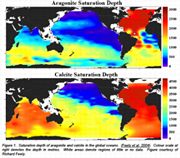| The effects of pH on the distribution of organisms at Race Rocks. Useful Links:
“Global oceans are becoming more acidic due to increasing carbon dioxide (Orr et al. 2005). Much of the extra CO2 released by burning fossil fuels ends up in the oceans, increasing the dissolved inorganic carbon concentration (DIC). As DIC increases, the relative proportions of carbon species shift (specifically from the carbonate ion to the bicarbonate ion), resulting in an increase in acidity and a decrease in pH (Strum and Morgan, 1981). At present the pH of seawater has decreased by about 0.1 due to oceanic uptake of anthropogenic carbon and is projected to decrease by 0.4 by the year 2050 (Orr et al. 2005). The decrease in pH (and concurrent decrease in carbonate ion) means that organisms that produce calcite and aragonite shells or structures, such as pteropods, corals and shellfish, are threatened (The Royal Society, 2005).” 2. THE EFFECT OF HYDROGEN ION CONCENTRATION UPON THE INDUCTION OF POLARITY IN FUCUS EGGS http://www.jgp.org/cgi/content/abstract/20/3/491 3. THE EFFECT OF ALKALINITY UPON MUTUAL INFLUENCES DETERMINING THE DEVELOPMENTAL AXIS IN FUCUS EGGS 1. When two eggs of Fucus furcatus develop in the dark within 0.3-4 egg diameters of each other, the point of rhizoid origin and the developmental axis are influenced by the presence of the neighbor. http://www.biolbull.org/cgi/content/abstract/78/3/407 4. Discovering the Effects of CO2Levels on Marine Life and Global Climate In recent months, the media have begun to focus on another effect of rising atmospheric CO2 concentrations: the effect of increasing CO2 levels on marine life. The oceans absorb 22 million tons of carbon dioxide every day, writes Richard Feely, a scientist with the National Oceanic and Atmospheric Administration (NOAA) in a 2006 science brief, “Carbon Dioxide and Our Ocean Legacy” (100 KB PDF). Although this absorption is said to significantly reduce atmospheric greenhouse-gas levels, some scientists have observed that such an excess of CO2 may be altering the chemistry and biology of the world’s oceans.By Kate Bradshaw 5. Dropping pH in the Oceans Causing a Rising Tide of Alarm http://www.thew2o.net/archive_new.html?id=28 6. Researchers report on possible biological effects .http://www.mbari.org/news/news_releases/2001/oct12_seibel.html 7. Bush’s CO2 Dumping Plan Could Devastate Sea Life http://www.scienceagogo.com/news/20031019174538data_trunc_sys.shtml 8. SEAKEEPERS PROVIDING KEY DATA ON OCEAN ACIDIFICATION AFFECT ON GLOBAL WARMING http://www.seakeepers.org/featured-ocean-acidification.php 9. Also a general index at: https://search.usa.gov/search?affiliate=usgswebarchive&query=ph |
| See also our file on Ocean Acidification in 4.2 The Importance of pH. |
Race Rocks Ecological Reserve-
marine ecology educational resource, remote-control webcams,elephant seal colony,Sea lion haulout,sustainable energy, solar energy

